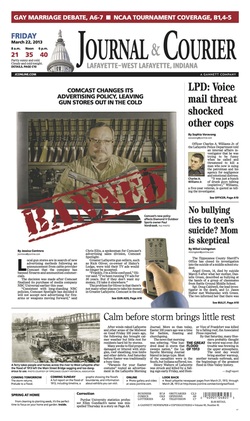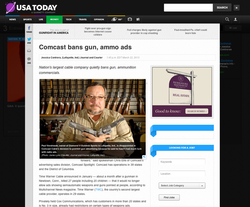March 22, 2013
Nation's largest cable company quietly bans gun, ammunition commercials
|
See it in print.
See the story on USATODAY.com
|
LAFAYETTE, Ind. — Gun stores in areas that Comcast Cable serves are looking for new ways to advertise after the cable provider said it would not accept firearm and ammunition commercials.
Comcast (CMCSA), the nation's largest cable-TV company, made the decision last month after it finalized its purchase of media company NBCUniversal, which Adweek magazine said has had a long-standing in place banning those items and fireworks. "Consistent with long-standing NBC policies, Comcast Spotlight has decided it will not accept new advertising for firearms or weapons moving forward," said spokesman Chris Ellis of Comcast's advertising sales division, Comcast Spotlight. Comcast has operations in 39 states and the District of Columbia. Time Warner Cable announced in January — about a month after a gunman in Newtown, Conn., killed 27 people including 20 children — that it would no longer allow ads showing semiautomatic weapons and guns pointed at people, according to Multichannel News magazine. Time Warner (TWC), the country's second largest cable provider, operates in 29 states. Privately held Cox Communications, which has customers in more than 20 states and is No. 3 in size, already had restrictions on certain types of weapons ads. NBC says in its ad policy that it doesn't accept advertisements for weapons or fireworks, but commercials that include them as props will be reviewed on a case-by-case basis. However, the NBC Sports Network, a cable channel, continues to accept commercials for weapons used for hunting, such as shotguns and rifles, the Los Angeles Times said. Handguns, semi-automatic and automatic weapons and ammunition are banned. Comcast, Cox and Time Warner don't list the firearms ad restrictions on their websites. "Frankly, I'm a little confused," co-owner Rick Oliver of Haley's Lodge, a gun, knife and ammunition dealer here, said of Comcast's change. "I've been running TV ads for 30 years. But if they don't want my money, I'll take it elsewhere." The problem for Oliver is that the 200,000-resident Lafayette metro area, home to Purdue University and about an hour away from Indianapolis and two hours from Chicago, has few advertising options. Comcast is the only local cable provider, and the city has one broadcast station, a CBS affiliate. CBS Interactive says materials that promote firearms directly or indirectly can run only in areas where 70% of the population is above the legal age, and the CBS advertising division also must approve the commercials. Oliver said he plans on reallocating his television advertising budget to radio and print. On principle, Oliver said he also stopped running TV ads for his second business, Haley's Lock, Safe & Keys. Paul Vondrasek, owner of gun and ammunition store Diamond V Outdoor Sports, said he hasn't had much luck with radio advertising here. "I don't really know how successful it was," Vondrasek said. Comcast declined to comment on the effect on its finances because of the policy change. Gun-control advocates are applauding Comcast's decision and hoping other influential media businesses will follow suit. Several broadcast networks, including Fox and ESPN, have similar policies against accepting ads for firearms, Adweek says. "This is a really brave move for Comcast, and I give them a standing ovation," said Julia Chester, Midwest regional coordinator for Moms Demand Action for Gun Sense. "Advertising has such a huge impact on public opinion, and we're really at a tipping point in the gun violence conversation." But Greg Hasek, manager at Four Guns here, counters that the ban on gun advertisements is singling out one industry. He points to widespread advertisements for alcohol, which can lead to drunken-driving deaths. "There are so many things that can harm people if they let it," Hasek said. "Buffets are so unhealthy they can lead to death by obesity complications. Are we going to stop advertising buffets?" |





